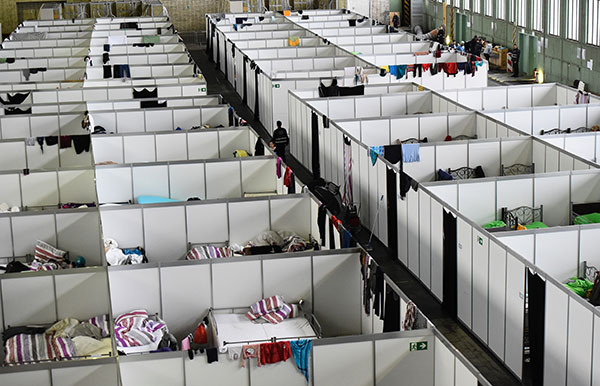Entrepreneurs step in to help the refugees

Roula Khalaf, Editor of the FT, selects her favourite stories in this weekly newsletter.
Bombarded with harrowing coverage of the war in Syria and of the desperate plight of refugees seeking to flee it, some might feel uncomfortable with using the crisis as an opportunity to make money. But alongside reports of criminals enriching themselves at migrants’ expense — the UN Office on Drugs and Crime, for example, estimates that the main smuggling routes for migrants into the US and Europe alone generate $6.75bn for smuggling gangs per year — many legitimate businesses are also seeing a way they can help.
One of those is European Homecare, a family business established in Germany in 1989 and which is now the country’s largest provider of accommodation for refugees. Klaus Kocks, spokesman for the company, says it has 900 employees caring for and feeding 15,000 asylum seekers in 90 “very different forms of accommodation”. He says the business, which now mainly looks after migrants, turns over €100m a year. “We don’t buy two or three beds. We buy 10,000 beds,” says Kocks, explaining the scale of the business.
The authorities in Germany pay European Homecare between €11 and €19 per asylum seeker per day for a full service that includes housing, food, medical care and other services such as language courses.
Kocks pointed to a recent German local media report, which said that when authorities send an unaccompanied child into a state-owned institution it costs an estimated €150 per capita per day. “[Our service] is saving taxpayers money,” he says.
The problem is, as Kocks notes, that private sector involvement in the refugee crisis is viewed with extreme suspicion.
If a child is hurt playing in a camp run by the Red Cross, people would say it was a dreadful accident, he points out, while if the same thing happened in a camp run by a profit-making enterprise, people would be far quicker to blame the company.
European Homecare should know. In 2014, the company was embroiled in controversy after a video came to light that showed guards abusing an asylum seeker in one of their camps.
Kocks says European Homecare now ensures that security services for the camps are hired by local authorities.
ORS, the other large provider of accommodation in Europe has also run into controversy. The Swiss-based company that operates in Germany and Austria attracted wide condemnation in the media at the height of the refugee crisis in the Autumn of 2015 over questions about its services at one overcrowded camp. Equistone, the London-based private equity firm that bought ORS in 2013 was unwilling to provide any financial information about the company but confirmed press reports that ORS had revenues of $99m in 2014 were “broadly accurate”. The spokesman said the number of staff employed by ORS had almost tripled from about 500 when Equistone bought the company, to about 1,400 today.
But despite the difficulties, private sector participation is seen as essential.
“It’s a sensitive topic because any time a for-profit entity is involved you have to be very careful that you’re not seen as profiteering. But at the same time the private sector can be more efficient,” says Scott Wu, chairman of the US Committee for Refugees and Immigrants.

Wu left Harvard Business School in 1994 and co-founded two private equity firms before deciding to devote himself to helping the world’s underprivileged. As chairman of the USCRI, he has visited several refugee camps and has just finished a two-year assignment working as a consultant for USAID.
He points out that the UN estimates 60m people globally are displaced and adds that on average a refugee spends 15 years in a camp setting.
Migrants need more than just food and accommodation, however.
JJ Agudelo co-founded United Spirit of America to provide portable personal hygiene products to US servicemen but now provides the same range of shampoos and wipes to refugees.
Agudelo says the company offers the products at a steep discount to people who want to help refugees and then ships their purchases to organisations such as Unicef.
Margins are extremely low, but because volumes are high the company has still done well. “We started shipping to Germany in early November,” says Agudelo. The company turned over $100,000 in the three months to the end of December and Agudelo says the rescue part of the business now accounts for nearly a quarter of all sales.
In Germany, where some estimates put the number of refugees that arrived in 2015 at more than a million, there has been a flurry of start-ups.
Philipp Sandner, a professor at Frankfurt School of Finance and Management, says between 150 and 200 companies have been established in Germany to serve refugees since the spring of 2015. They range from Kiron, a non-profit educational institution that will allow refugees to complete their degrees, to Workeer, a job-matching platform that is free to use.
“It’s difficult to identify who will be wealthy in this area, but 200 start-ups speaks for itself,” Sandner says.
Yet ultimately, corporate activity in this area is a sign of the private sector’s attempt to help. “It’s my belief that the private sector will have to be involved because the refugee crisis is too large a problem for governments . . . to handle on their own,” says Wu.
Comments